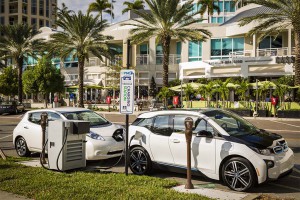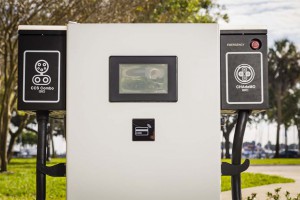
Get used to sights like this as Nissan and BMW are partnering to develop hundreds of new faster charging stations across the U.S.
Two of the leaders in the emerging market for “electrified” vehicles have decided to team up in a bid to make it easier for owners to charge up away from home.
BMW and Nissan are partnering in an effort to set up fast-charging stations at 120 locations across the U.S. The Level III systems are capable of giving a vehicle like the Nissan Leaf or the BMW i3 and 80% charge in as little as 20 to 30 minutes, far less time than a conventional charging system.
“BMW continues to pursue new ways to support the development of a robust public charging infrastructure that will benefit current and future BMW i3 owners across the country,” said Cliff Fietzek, Manager Connected eMobility, BMW of North America. “Together with Nissan, we are focused on facilitating longer distance travel so that even more drivers will choose to experience the convenience of e-mobility for themselves.”
The lack of an ample public charging network has frequently been cited by studies as a key reason why consumers are reluctant to adopt battery-electric technology. That’s all the more of an issue with current-generation batteries that typically limit range to around 100 miles per charge.
(Saab returns – finally – as an electric vehicle in China and Sweden. For more, Click Here.)

The new jointly developed charging stations from BMW and Nissan can give a Leaf or an i3 an 80% charge in 30 minutes or less.
Experts believe that wider availability of chargers will reduce so-called range anxiety – all the more so when owners can access higher-power chargers like those being put in place by the BMW-Nissan partnership.
Together, they plan to install dual-port chargers at 120 locations in 19 states. That includes California, Connecticut, Florida, Georgia, Illinois, Indiana, Maryland, Minnesota, Missouri, New Mexico, Nevada, New York, North and South Carolina, Ohio, Pennsylvania, Tennessee, Virginia and Wisconsin.
The chargers include two different types of ports to service Nissan Leaf and BMW i3 battery-electric vehicles – and a number of others that can use CHAdeMO and CCS connectors. The 440-volt DC, 40-kilowatt-hour systems can recharge a totally drained battery in as little as 20 minutes, hours faster than even a 220-volt Level II system.
“Nissan takes a three-pronged approach to growing public EV charging options for Leaf drivers by installing quick chargers in the community, at corporate workplaces and at Nissan dealerships,” said Andrew Speaker, Nissan’s director of Electric Vehicle Sales and Marketing.
(Click Here for details about Mazda capturing the most fuel efficient brand title again.)
To make it easier for drivers, the new chargers can be located using either the BMW ConnectDrive infotainment system or BMW I Remote App, or via the Nissan EZ-Charge smartphone app. The chargers also accept Nissan’s EZ-Charge card. The Japanese maker now offers free charging to Leaf owners in a number of major cities.
Nissan and BMW aren’t the only ones who have gotten into the charger business. Tesla has been expanding its own Supercharger system, establishing hundreds of high-speed chargers across the U.S. and Canada.
Both Nissan and BMW, meanwhile, have joined up with a broader consortium of automakers, charger companies and other firms. Dubbed ROEV, FOR roaming for Electric Vehicle charging, the new venture aims to make it easier for owners of battery-based vehicles to plug in wherever they go. It will let them access the vast majority of public charge stations without having to sign up with a variety of different service providers.
(For more on the ROEV consortium, Click Here.)
The goal is to “make sure every station is capable of serving every vehicle out there,” explained Brendan Jones, a vice president of NRG EVgo, one of the partners in the new charging consortium. “ROEV is reducing the barrier (to EVs by letting) people know they can charge anywhere.”

Time is running out and the fines for not being able to meet the absurd 54.5 mpg, CAFE requirement will be substantial. That’s why there is a sudden rush to EVs and bicycles. Consumers are going to get raped by the EPA and Obama past administration unless some sanity prevails and the 54.5 mpg decree is canned.
Gt101 so the world is still flat. You must be sponsored by either Koch Communications or Ernie Addelson as both are trying their hand at proproganda of the extreme right. Maybe if you keep chanting Santa Claus will bring you a chunk of coal something old defenders of diesel volkswagens would like. The move EVs has started and its becoming economical. Sanity will prevail.
DWH – Being in denial doesn’t make your beliefs true as we have discussed before numerous times. When you are unable to defend your beliefs you resort to attacking the messenger, which is childish and it doesn’t change anything. Your disconnect from reality and constant chanting that the world is flat is not going to make it true.
The fact is the Obama administration is promoting over-priced EVs instead of practical high mpg clean diesel engines that the rest of the world has used for decades. The only means Obama and friends have to effectively sell more impractical EVs is to hold a gun to auto maker’s heads with the 54.5 mpg CAFE mandate. Wait until consumers see the thousands of dollars in fines they will pay once Obama is gone from office and 2025 rolls around. Most major auto makers are unable to meet the completely meritless 54.5 mpg CAFE decree that has zero science to support it unless they sell EVs and bicycles.
Forcing tax payers to subsidize a bad personal transportation choice while forcing non-users to pay for an EV recharging infrastructure is both illegal and completely unacceptable. Some states are finally waking up to this ruse of forced sales of EVs and the toxic waste issue that society must soon address. After a few more Li-ion battery fires and a couple class action lawsuits EVs may be nothing more than a bad scam that has come and gone. Anyone who wants an electric vehicle would be far smarter to buy a hydrogen fuel cell powered vehicle as they will replace battery powered EVs soon.
It’s important to ensure that we make it easy for people to favour the efficient vehicles. I hear from a lot of my car financing customers that they are worried about being able to find sufficient options for “fuelling up” their electric cars and end up choosing another that runs on fuel.
Why exactly should we make it easy for people who chose impractical EVs over practical, efficient clean diesels, to fuel up easily? In my world I pay for the mode of personal transportation that I desire. I don’t expect anyone else to subsidize my personal transportation choice. Why should I pay for someone else’s choice of personal transportation and pay for the recharging infrastructure that does not exist for EVs? The recharging system should be paid for by consumers who use it, not by tax payers. EV users should also be taxed for road use like all who pay highway fuel taxes. EV users should also be taxed for toxic recycling costs.
There is no logic to promoting an impractical form of personal transportation and then charging other people to pay for the choices of those who are infatuated with EVs. EVs are not public transportation they are personal transportation devices and a proven poor choice for many reasons.